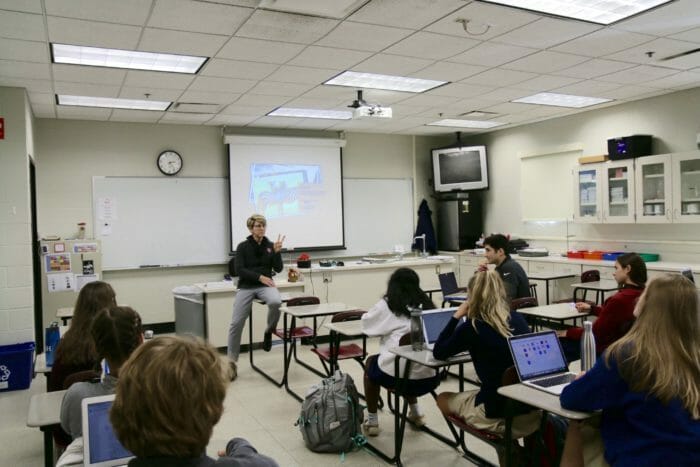Social research, specifically participatory action research, is valuable for students because it allows them to examine the social relationships around them and it is a procedure that can lead to positive change in their school’s culture. By taking part in this course, I became more engaged with my surroundings and gained perspectives, both within our community and outside of it. I now have a better understanding of why people from different backgrounds have particular views or opinions, and how society influences behavior in our small school. I am grateful for the opportunity CSBGL provided me, as it helped me become a more active and aware person.
Academy is continuing its involvement with the Penn program this year. Under the guidance of Diversity Director, Dr. Beckett Broh, and Upper School Dean, Mr. Pascal Losambe, a group of 13 CA students have embarked on a year-long journey of exploring a social topic pertinent to their school.
The program has been rebranded as the School Participatory Action Research Collaborative (SPARC). The term “participatory action research” emphasizes students’ ability to improve their own communities. According to SPARC’s website (sparc-csbgl.org), the ultimate goal is to “ensure that diverse groups of students engage in research that explores gender, relationships, and identity at their respective schools.”
Thus far, Dr. Broh and Mr. Losambe have designed class activities to introduce the group to topics and skills that will be beneficial for them in this process. This year’s curriculum began by reviewing existing sociological literature and analyzing published data, such as Dr. Peggy McIntosh’s White Privilege: Unpacking the Invisible Knapsack. The texts covered issues relating to power, gender, race, class and sexuality in the United States.
Class assignments involve creating a map of Academy and taking note of location-dependent culture shifts. Such activities have helped students become more aware of the social structures existent in the CA community,and prompted them to come up with a number of potential topics, including seniority and hierarchy, technology, religion, dress code and gender in sports.
Aden (current student): In addition, the course offers time for discussing school issues that arise throughout the year. For instance, after the policies regarding spirit squad were changed, we spent a class period discussing the hierarchies changed by this structure and learned to talk about a controversial issue with eloquent language. These opportunities led to the desire to pursue the topics that we are potentially researching, as well as provide a safe space to discuss our issues with school administrators who were there to listen.
Although students were fired up when discussing these issues, taking a dive “under the iceberg” to analyze the values and beliefs that fuel these decisions was a powerful lesson in empathy. We saw the real intentions behind certain rules, instead of assuming that their only goal was to hurt the student populace or incite anger among us.
This exploratory phase of the class where we uncovered possible topics was more discussion-based, but assignments geared around understanding culture and behavioral norms helped to fuel the fire and determine the direction of research questions.
Within the past few weeks, students moved on to constructing an exploratory survey to measure the demographics of the high school. The results of this survey will serve as a foundation for the specific social issue they choose to study.
The survey is carefully designed to maintain participants’ interest while creating a comprehensive understanding of student attitudes. It focused on both inclusivity and anonymity for students, ensuring that proper attitudes could be measured precisely among over 400 students with diverse backgrounds.
After students took the survey, the class began to analyze the data in search of individual trends that could spark research questions. The most interesting part of this came before even pulling up the data – when we learned about research ethics. We quickly discovered how important it is to keep our results confidential, deception-free and voluntary.
As we have transitioned from this exploratory phase of the class, distinct research teams have formed to cover topics that retrieved interesting data from the survey. After extensive literature review to determine starting points and research questions, additional rounds of data collection through polls, focus groups and interviews will hone in on the issues that Academy students think matter.
A select group from this class will be traveling to UPenn’s campus in the spring for the annual Roundtable conference. Here, students will present their findings to the SPARC faculty and participants from the other six member schools.








